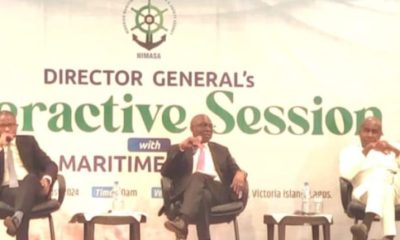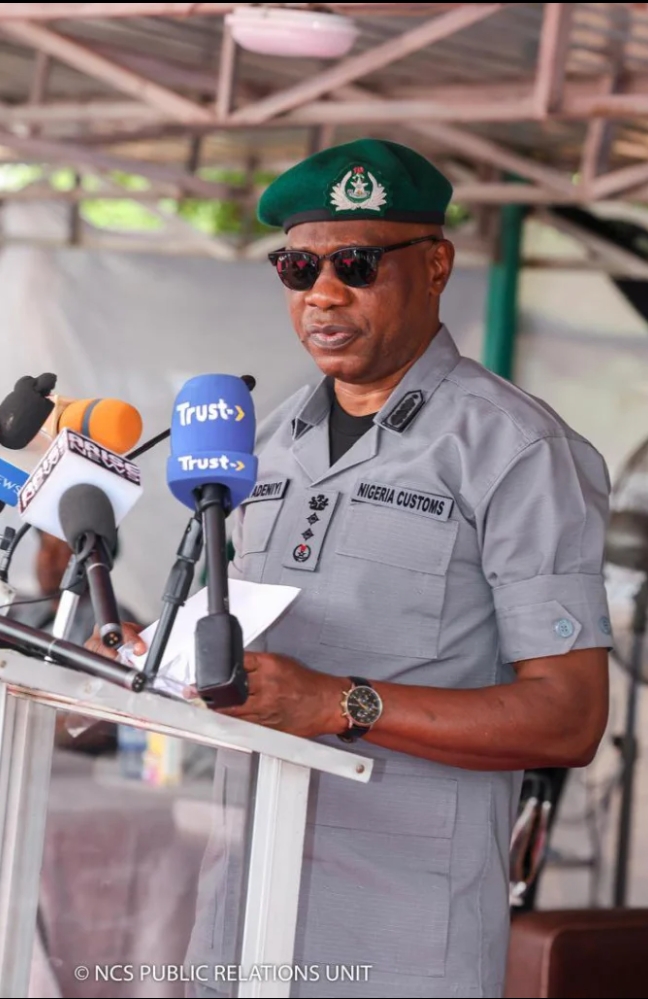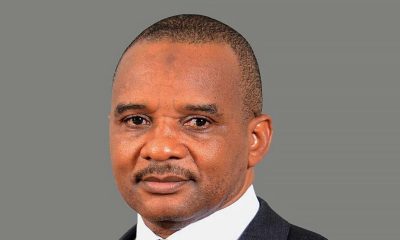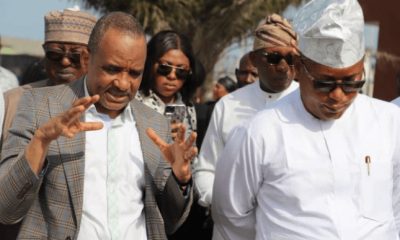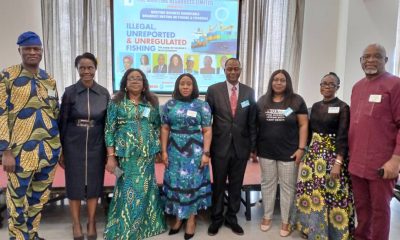Maritime Agencies
NIMASA MODULAR FLOATING DOCK: Concerns About Delayed Deployment And Transparency.
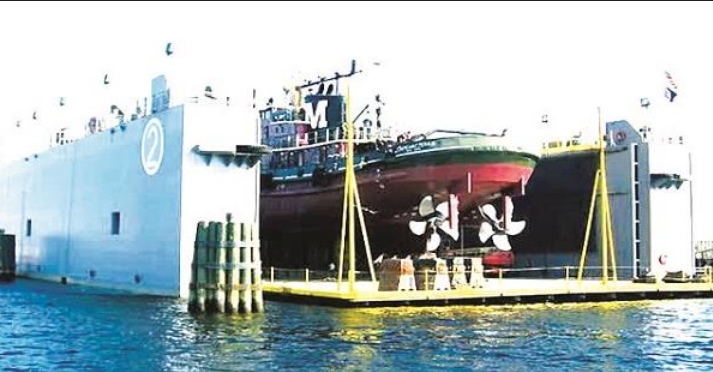
By Izuchukwu Ozoemena
Contrary to expectations, NIMASA’s N50billion modular floating dock has remained a subject of controversy since 2018 when the apex maritime administration and safety regulator acquired it.
Initially moored at the Marina Waterfront, concerns have continued to mount about the whereabouts and management of the facility. NIMASA appears not to be doing enough to convincingly respond to pressing questions stakeholders have been asking about its fate.
Despite promises of relocation and utilization, the floating dock remains elusive, thus fueling concerns about lack of due process, transparency and accountability within the agency.
Last February, NIMASA announced plans to move the dock to Continental Shipyard in Apapa. Four months down the line, the deployment has yet to occur and no concrete reasons have been given to explain this.
This delay has fueled skepticism especially among industry watchers, who have continued to question NIMASA’s commitment to managing the multimillion-dollar asset effectively.
When the floating dock was acquired in 2018, ship owners who hitherto went to neighbouring maritime nations to dry-dock vessels heaved a sigh of relief. It was celebrations galore as they were made to believe that the new facility represented a significant step in the country’s efforts towards upgrading her critical maritime infrastructure. To them, Nigeria had taken a significant step to enhance her ability to maintain a unique position as a foremost vessel maintenance and repair nation in the West and Central African region.
To the chagrin of stakeholders, however, promises of deployment have been repeatedly made and flouted. And explanations as to why this is so remains scanty, resulting to accusations of neglect, underutilization and mismanagement.
Criticisms have been directed at NIMASA’s leadership, particularly under the immediate-past Director-General, Dr Bashir Jamoh, for perceived lapses in strategic planning and execution.
Standing out in these criticisms is Otunba Sola Adewumi, President, Nigerian Ship Owners’ Association (NISA) who has sued for accountability and transparency within NIMASA.
Dr. Chris Ebare, Chairman of the Institute of Chartered Shipbrokers (ICS) is not left out in this as he has emphasized the need to involve specialists and experts in managing critical industry facilities such as the Modular Floating Dock.
He suggested a re-evaluation of NIMASA’s approach towards the use and deployment of the facility, advocating that only dedicated technocrats and professionals be given a free hand to manage the asset independent of any form of interference from the agency’s leadership.
Engr Matthew Alalade, former National President, Nigerian Merchant Navy Officers & Water Transport Senior Staff Association, has equally voiced concerns about NIMASA’s decision-making process especially on the use of the floating dock. He urges greater consultation with stakeholders especially professionals in the field. NIMASA, he suggests, should consider concessioning the dock to established shipyards to ensure proper management.
Amidst these concerns, a staff of NIMASA who pleaded anonymity offered a critical perspective on the situation.
“The challenges we face with the floating dock”, he opined, ” can largely be attributed to the previous leadership’s reluctance to heed expert advice, which unfortunately has resulted in the asset becoming nearly outdated before being fully operational.”
He further stated that the new Director-General, Dr. Dayo Mobereola, is aware of the issues and is committed to resolving them.
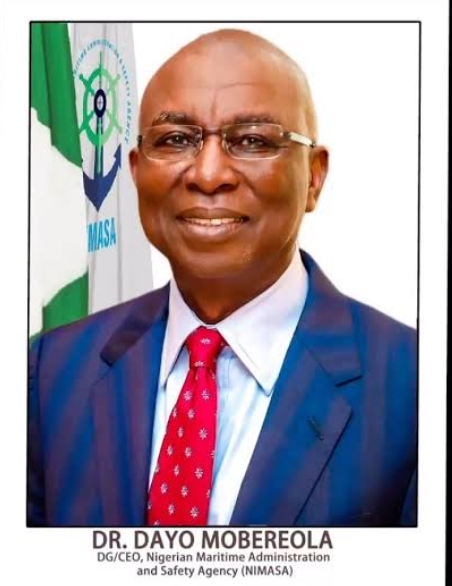
“Dr. Mobereola has been thoroughly briefed about the current status and complexities surrounding the floating dock.
He will be actively engaging with technical experts and stakeholders to expedite its deployment and ensure it operates at full capacity as swiftly as possible,” he stated.
Expectations are high that as an insider had said, the new helmsman will be favourably disposed to make a difference this time by accommodating expert views on the use of the critical facility to enable Nigeria realize the motive for acquiring the facility. But when and how he is going to do this remains embedded in the bowel of time.
Maritime Agencies
Lekki Deepsea Port Set To Clinch 500,000 TEUs, Becomes Trans-shipment Hub In West Africa
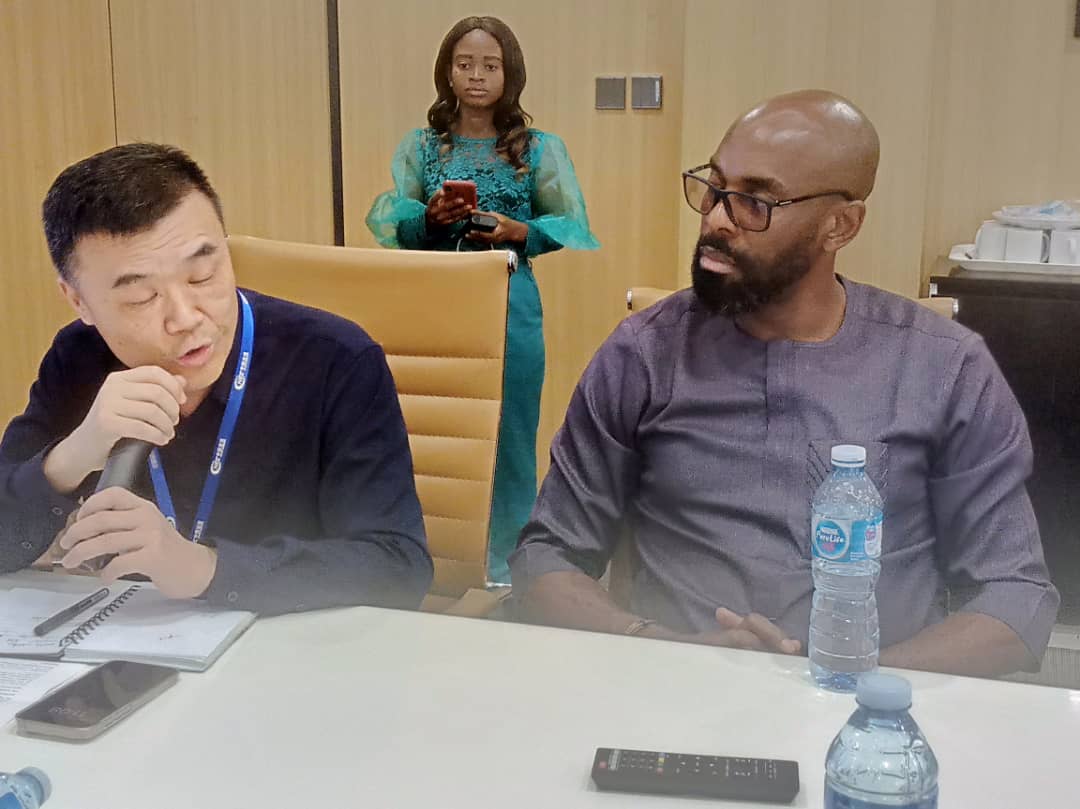
By Izuchukwu Ozoemena
Yang Xixiong, the Chief Operating Officer, Lekki Port has said the deepsea port which commenced operations in 2023 has come to place Nigeria in her rightful position as a shipping hub that has assumed her rightful position and relevance in regional and global economy.
The CEO who disclosed this in Lagos,Thursday, while rubbing minds with members of the press assured that the new port has stabilized and would, going forward,continue to raise the bar of relevance to international standards.
“We continue to push the envelope, set the bar higher to uphold our position as West Africa’s deepest sea port,” Xixiong announced.
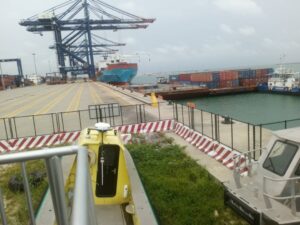
A section of critical facilities at the Lekki Deepsea Port.
“The result of our unrelenting commitment to world-class standards is visible in the gigantic footprints we are putting on the map of maritime trade in Africa, deploying technology, driving operational efficiency, and shaping regional trade,” he added.
Already, Lekki Port has commenced trans-shipment operations to some regional ports in West Africa such as Togo, Ghana and Côte d’Ivoire.
In his intervention, Daniel Odibe, Deputy Chief Operating Officer, who spoke further on the increase in trans-shipment capacity added that recently, Lekki Deepsea Port conducted a trial trans-shipment to Onne Port.
Odibe said, “We had our first trans-shipment operations in 2023, which is the first in the Nigerian economy.
Between January and June, 2025, the port processed 222,000 Twenty-foot Equivalent Units (TEUs) of cargo and has her hands steadily on the plough to jerk up the performance so as to achieve the targetted record of 500,000 TEUs by the end of the year, a development that reflects a growing confidence in the port’s ability to achieve maximum operational capacity as per international standards.
“Before now, countries like Togo, Ghana, and Côte d’Ivoire used to be the trans-shipment hubs for Nigeria-bound cargoes. You know what that means for our cargo? They spend more time coming to us. They incur more costs because they are double-handled in those trans-shipment hubs, all because Nigeria didn’t have a deep-sea port.
”The story is in our favour right now. We are now talking about international trans-shipment. We are now doing international trans-shipment to other West African countries such as Ghana, Côte d’Ivoire, Abidjan, Togo and Cotonou.
”Currently, you have ports like Warri, Calabar, Onne, and then we have inland ports like Onitsha and Burutu. Some of these ports, foreign vessels don’t go there because the draft is low. So the idea here is to have cargoes for those ports. That will open up economic opportunities in those areas.
“We did some trials last year with Onne. It had some challenges, but again, it was an eye-opener and we are looking at restarting that again this year in collaboration with the shipping lines and baggage operators.”
On cargo throughput volume, Odibe assured that cargo volumes are now gradually improving steadily despite initial hiccups arising from instability in the rate of the Dollar.
Currently, the port receives between 10-12 vessels every month. The record, he added, is steadily picking up.
“Volumes fell because of Naira depreciation and the removal of fuel subsidy; this caused a setback in our projection. As of 2023, when we started operations, we did 54,289 TEUs, and as of June of this year, we have done 222,000, and we are projecting 500,000 TEUs.”
Odibe also stated that the vessel turnaround time at Lekki Port currently stands at 48 hours as against one hour and 25 minutes for truck turnaround time, while cargo dwell time is 16 days.
Maritime Agencies
MAMAL 2025: MARAN Demands End to War Risk Premium, Set to Expose Maritime Fraud in Gulf of Guinea.
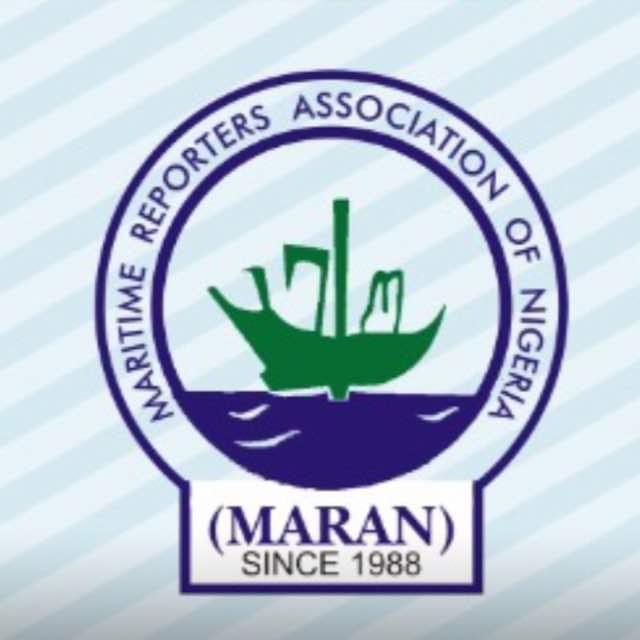
By Izuchukwu Ozoemena
Come August 28, 2025, the Maritime Reporters Association of Nigeria (MARAN) will host the 3rd edition of her annual Maritime Lecture (MAMAL) at the prestigious Eko Hotel and Suites, Lagos.
This year’s lecture will spotlight the ongoing international fraud perpetrated by foreign shipping lines under the guise of “War Risk Premiums” on vessels calling at Nigerian ports, aiming to draw the Federal Government’s urgent attention to the issue.
Speaking on the theme of MAMAL 2025 which is “Addressing the Burden of War Risk Insurance on Nigerian Maritime Trade,”MARAN President, Mr. Godfrey Bivbere, strongly condemned the war risk insurance, describing it as an international fraud burdening the economy of Nigeria and other developing countries in the Gulf of Guinea.
The extra war risk insurance (WRI) levied on Nigeria-bound vessels varies significantly. For instance, a very large crude carrier (VLCC) can incur a WRI surcharge of $445,000 per voyage, while a new container vessel may face a charge of $525,000 per voyage. Beyond this, some shipping companies such as Maersk, have introduced additional fees like a transit disruption surcharge, while others impose a war risk surcharge of $40-$50 per 20-foot container.
MARAN contends that these exorbitant charges are further strangulating Nigeria’s already-strained economy.
Also, despite Nigeria’s Minister of Marine and Blue Economy, Adegboyega Oyetola recently confirming that Nigeria has not recorded a single pirate incident in the past three years, the imposition of war risk premiums continues unabated.
Oyetola credits this peace in the Gulf of Guinea to the multi-billion naira Deep Blue Project, a robust maritime security initiative spearheaded by the Nigerian Maritime Administration and Safety Agency (NIMASA).
Despite these commendable efforts by the Federal Government, MARAN is concerned that foreign shipping lines continue to unjustly extract millions of dollars from Nigerian shipowners in the name of War Risk Insurance Premium, even though there are no demonstrable risks in the region.
In March 2025, Dr. Dayo Mobereola, Director General of NIMASA, met with a delegation from the Danish Ministry of Foreign Affairs, led by Kristin Skov-Spilling, where he passionately appealed to the international community to acknowledge Nigeria’s significant progress in securing its waters. He emphasized the critical need for a corresponding reduction in war risk insurance costs.
Dr. Mobereola stated, “The Nigerian government has demonstrated a strong commitment to maritime security, leading to nearly zero incidents of piracy and armed robbery in the Gulf of Guinea over the past four years. Despite this, vessels coming to Nigeria continue to pay high war risk premiums, which is unjustifiable given the improved security landscape.”
Speaking further on the upcoming MAMAL Annual Maritime Lecture 2025, MARAN President Godfrey Bivbere asserted that international shipping companies operating in Nigeria have shown “lackadaisical and complacent attitude towards the economic and social wellbeing of Nigeria as a nation.”
He explained that MAMAL 2025 aims to thoroughly examine the perceived threats, realities, and profound implications of persistent Extra War Risk Insurance (EWRI) on Nigeria’s maritime trade and the wider Gulf of Guinea (GoG).
Providing more details about the highly anticipated conference, which has consistently served as a crucial rallying point for all maritime stakeholders due to MARAN’s respected voice, Bivbere added:
”The Summit will also explore issues leading to the classification of the nation’s waters as high-risk zones, roles of classification societies like the Lloyds of London, the roles of core stakeholders like NIMASA, Nigerian Navy and other maritime and security operators.”
According to Bivbere, “The MAMAL 2025 is expected to draw over 500 key stakeholders, including maritime security experts, shipowners, terminal operators, international shipping lines, diplomats, insurers, regulators, and legal experts.”
Maritime Agencies
Apapa Customs Revives Rail Haulage of Cargo, Shuts Three Bonded Terminals
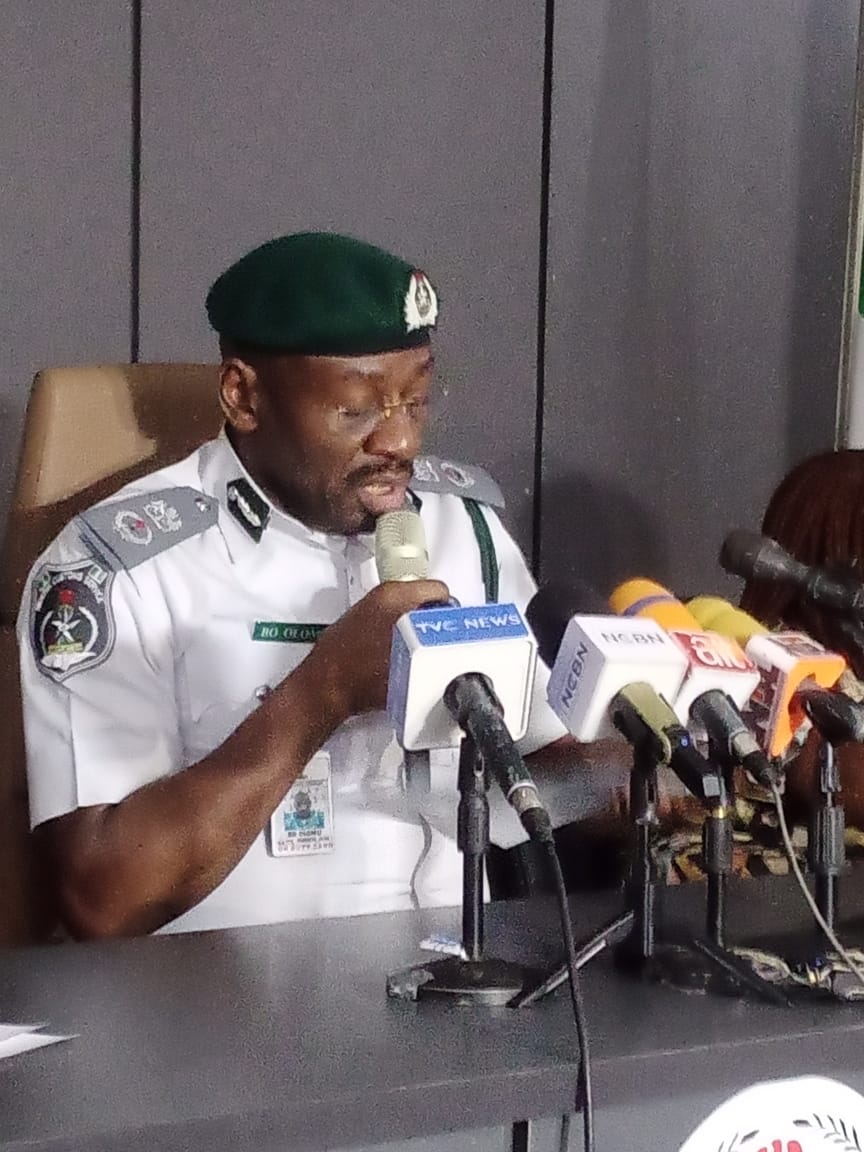
By Izuchukwu Ozoemena
Under the guidance of the Comptroller General of the Nigeria Customs, the Apapa Command is liaising with the Nigerian Railway Corporation (NRC) and other stakeholders on developing a standard operating procedure (SOP) for the movement of goods by rail from Apapa Port to other states.
The Customs Area Controller (CAC), Comptroller Babatunde Olomu, PhD, disclosed this while presenting his 2025 revenue half year report.
”| am pleased to express that the talks have shown prospects for success with pledges of support and anticipation for robust participation by all concerned”, he stated.
According to him, the effort to revive cargo movement by rail aims to decongest the port, reduce pressure on the Apapa roads, and provide a viable and cost-effective option for cargo movement by importers, exporters, freight forwarders, haulage operators and licensed
customs agents.
He revealed that in the first six months of 2025, the Command achieved a monumental revenue collection of N1,378,059,019,245.20, representing a 35% increase above the record of N1,023,663,842,255.63 collected in the same period in 2024. He attributed this feat to efforts of diligent officers and compliant traders.
”On my watch and under the direction of the CGC Bashir Adewale Adeniyi, MFR, psc (+), we have always insisted on maximum collection of government revenue by preventing leakage.”
In the area of trade facilitation, the CAC said the Unified Customs Management System (UCMS), also known as B’Odogwu, has gone live in the Apapa Command with laudable milestones.
Emphasizing the diligence of the command, he announced that in addition to the issuance of the Pre Arrival Assessment Report (PAAR) being issued using the homegrown technology, the Command achieved issuance of the first Single Goods Declaration on May 9, 2025 using the B’Odogwu platform, a significant shift towards faster, more reliable cargo handling.
”We have created a robust platform that facilitates trade and ensures the swift clearance of cargo.
”We are addressing challenges such as poor network connectivity, delays, and congestion associated with the former system.
The CAC showcased nine (9) containers comprising unregistered pharmaceuticals, used clothing, expired margarine, wild animals’ skin and codeine syrup which form part of the twenty-seven (27) containers seized between January-June 2025 with a duty paid valve of (DPV) of N9,267,443,966.00.
”These seizures are a fallout of our efforts at preventing Nigerians from unwholesome foods and drugs, stopping illicit trade, and protecting
our local industries.
”As a standard, we will never compromise the health, well-being, and safety of Nigerians on the altar of trade facilitation. Every consignment passing through our port undergoes a diligent check through scanning and physical examination when required.
Unregistered pharmaceuticals are most prominent on the list of twenty-eight (28) seizures made by the command during the period under review. The seizures comprise controlled drugs, used clothes,
codeine syrup, wild animals’ skin, and other sundry items.
”It is pertinent to note that the trafficking of wild animals contravene the Convention on Trade in Endangered Species (CITES), to which Nigeria is a signatory. Equally, on the detention list is a container of matches imported without the required End User Certificate (EUC) as provided for in our extant laws.
In a smart move to neutralise smugglers, CAC Olomu added, the Command sealed three bonded terminals.
One of the terminals has already been charged to court, while investigations are ongoing regarding the remaining two.
He affirmed the commitment of his Command to sanitize the port environment and maintain strict adherence to customs regulations by all stakeholders.
“As a result of our robust anti-smuggling efforts, three bonded terminals have been sealed. One is already undergoing prosecution in court, and we are currently investigating the others,” Olomu declared.
-
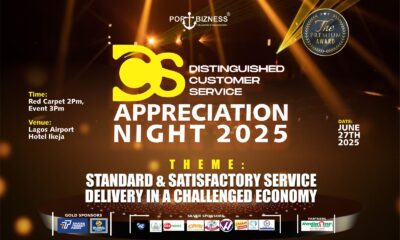
 Maritime Agencies2 weeks ago
Maritime Agencies2 weeks agoPORTBIZNESS Celebrates Excellence in Customer Service Delivery, Holds Special Awards Night
-

 Maritime Agencies3 weeks ago
Maritime Agencies3 weeks agoKebbi Customs Command Introduces Health Screening, Mandatory Sports To Ensure Work-life Balance
-
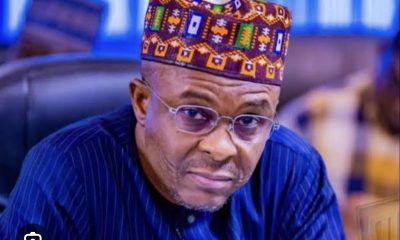
 Maritime Agencies1 week ago
Maritime Agencies1 week agoNPA Berths Nigerian-Owned Container Vessel,”MV OCEAN DRAGON,” To Boost Incountry and Regional Trade,
-
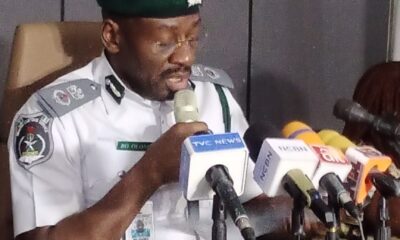
 Maritime Agencies3 days ago
Maritime Agencies3 days agoApapa Customs Revives Rail Haulage of Cargo, Shuts Three Bonded Terminals
-
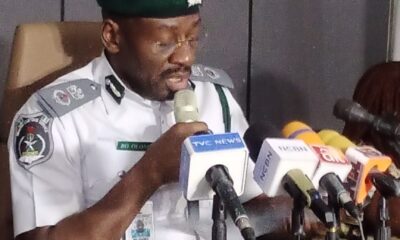
 Maritime Agencies1 week ago
Maritime Agencies1 week agoHALF-YEAR REVENUE DISPOSITION: Apapa Customs Hits N1.38Trillion, Confiscates Prohibited Goods Worth Billions.
-
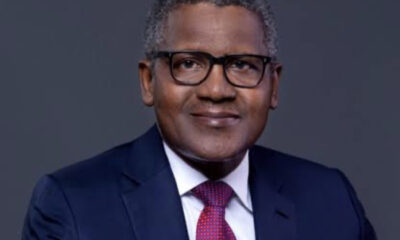
 Maritime Agencies4 days ago
Maritime Agencies4 days agoDangote Lauds NPA’s One-Stop Shop Committee, Donates Coaster Bus To Ease Operations
-
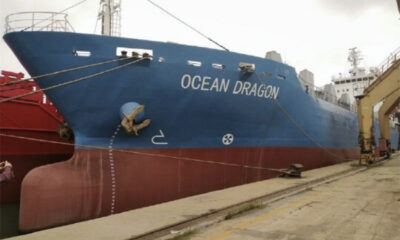
 Maritime Agencies1 week ago
Maritime Agencies1 week agoNIGERIAN PORTS AUTHORITY BERTHS FIRST WHOLLY NIGERIAN-OWNED CONTAINER VESSEL.
-
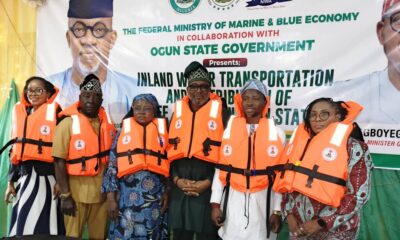
 Maritime Agencies3 days ago
Maritime Agencies3 days agoSAFETY ON WATER: FG Donates Life Jackets To Ogun State Government, Emphasizes Safety


